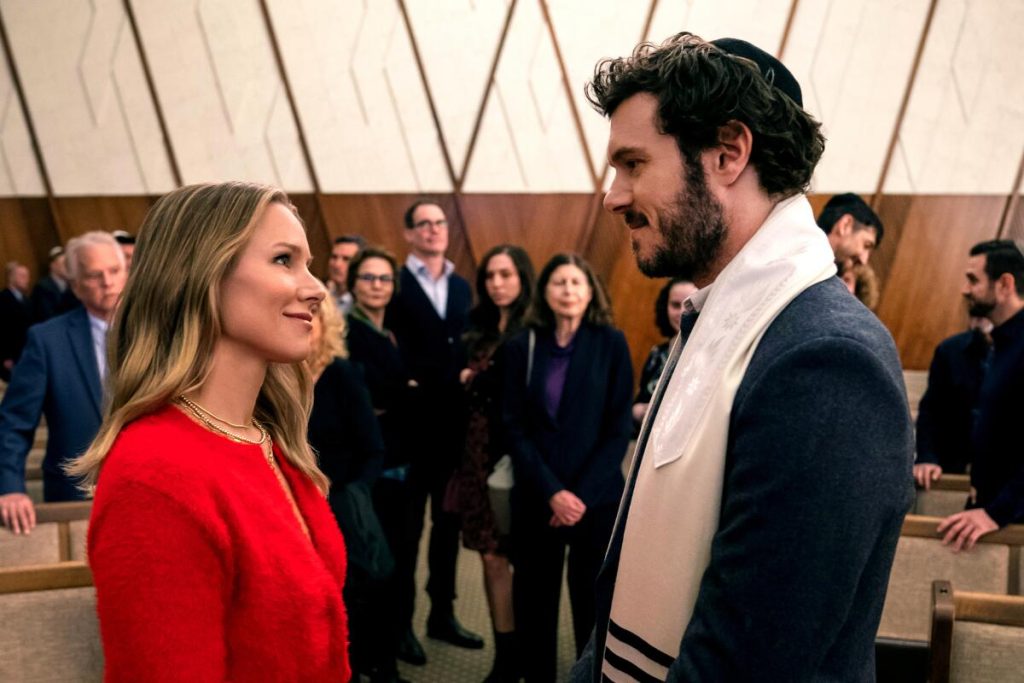Female Rabbis Reflect on Jewish Representation in “Nobody Wants This”
3 min read
Adam Brody as Noah, Kristen Bell as Joanne in "Nobody Wants This."

Adam Brody as Noah, Kristen Bell as Joanne in "Nobody Wants This."
The Netflix series “Nobody Wants This” has quickly captured attention with its unique blend of romantic comedy set against a backdrop of contemporary Jewish life. Unlike other hit shows like “Squid Game” and “Stranger Things,” this series, featuring Adam Brody and Kristen Bell, explores themes of love, faith, and identity in a light-hearted manner. As the show continues to trend, female rabbis are weighing in on its portrayal of Jewish culture and the nuances of their profession.
In the series, Bell plays Joanne, a free-spirited podcaster with no specific religious affiliation, who falls for Noah, a “hot rabbi” portrayed by Brody. As they navigate their relationship, they face challenges from their respective families and friends. The ensemble cast includes memorable characters like Joanne’s sarcastic sister, Morgan, and Noah’s traditional Jewish family members, which adds layers to the narrative.
One pivotal moment occurs when Joanne visits Noah at his temple, where congregants bombard him with requests to set him up with their daughters. The episode closes with a scene where Noah greets Joanne warmly, prompting his mother, Bina, to refer to her as a “shiksa,” a term often seen as derogatory for a non-Jewish woman in a relationship with a Jewish man. This moment sparked discussions about the show’s handling of Jewish themes and stereotypes.
Rabbi Amanda Greene, senior rabbi at Chicago Sinai congregation, found certain portrayals resonated with reality. “There’s a word ‘yenta’ out there, right?” she remarked. “Is that the best of who we are? Maybe not. But is that a reality of who some of us are? Maybe.” She emphasized that the show is ultimately entertainment, much like other exaggerated cultural representations, such as “My Big Fat Greek Wedding.”
Rabbi Adina Allen, a nondenominational rabbi and founder of the Jewish Studio Project, noted that while some Jewish female characters came off as controlling or harsh, they were not alone in that portrayal. “The non-Jewish women don’t come out looking so good either,” she observed. “They’re portrayed as shallow and self-absorbed. Yet, I liked the characters. Esther, for example, embodies the Jewish woman stereotype, but she’s also loyal and loving.”
Greene appreciated that not all representations of Jewish women were negative. She cited a scene with a female rabbi at a camp who warmly embraces Joanne, highlighting a positive depiction of female clergy. Greene pointed out that the show features a diverse range of interesting characters, adding depth to the narrative.
Both rabbis found elements of authenticity in the series, particularly regarding the social dynamics within a synagogue. Greene shared her experience of being inundated with matchmaking inquiries when she began her position. “There is some truth in that the congregation wants to know what’s going on in the personal life of the rabbi,” she said. Allen echoed this sentiment, noting how invasive it can feel for a young, single rabbi in a pulpit position, aligning with the chaotic matchmaking scene depicted in the show.
Greene and Allen viewed Noah as a relatable character, breaking the stereotype of a sanctimonious rabbi. “He was a person at a bar who didn’t fit the traditional mold of what a rabbi should look like,” Greene explained. “Rabbis are human beings, and it was refreshing to see that level of depiction.” They appreciated scenes, like Noah celebrating Shabbat in a bar, as reflective of their own experiences.
As the first season unfolds, Noah and Joanne’s relationship raises questions about cultural identity and the complexities of interfaith relationships. The storyline culminates in Noah’s dilemma between advancing in his rabbinical career and deepening his commitment to Joanne, who struggles with the idea of conversion.
Rabbi Greene expressed mixed feelings about the season’s ending, describing it as a “false dichotomy.” She hopes that future episodes will explore a more nuanced resolution, allowing Noah to navigate both his professional and personal life. “I loved the show, but I hated the ending,” she said. “My hope is that in season two, he’ll find a way to balance both.”
As “Nobody Wants This” continues to resonate with audiences, it sparks important conversations about representation, identity, and the diverse experiences within the Jewish community, highlighting the complexities of love and faith in today’s world.